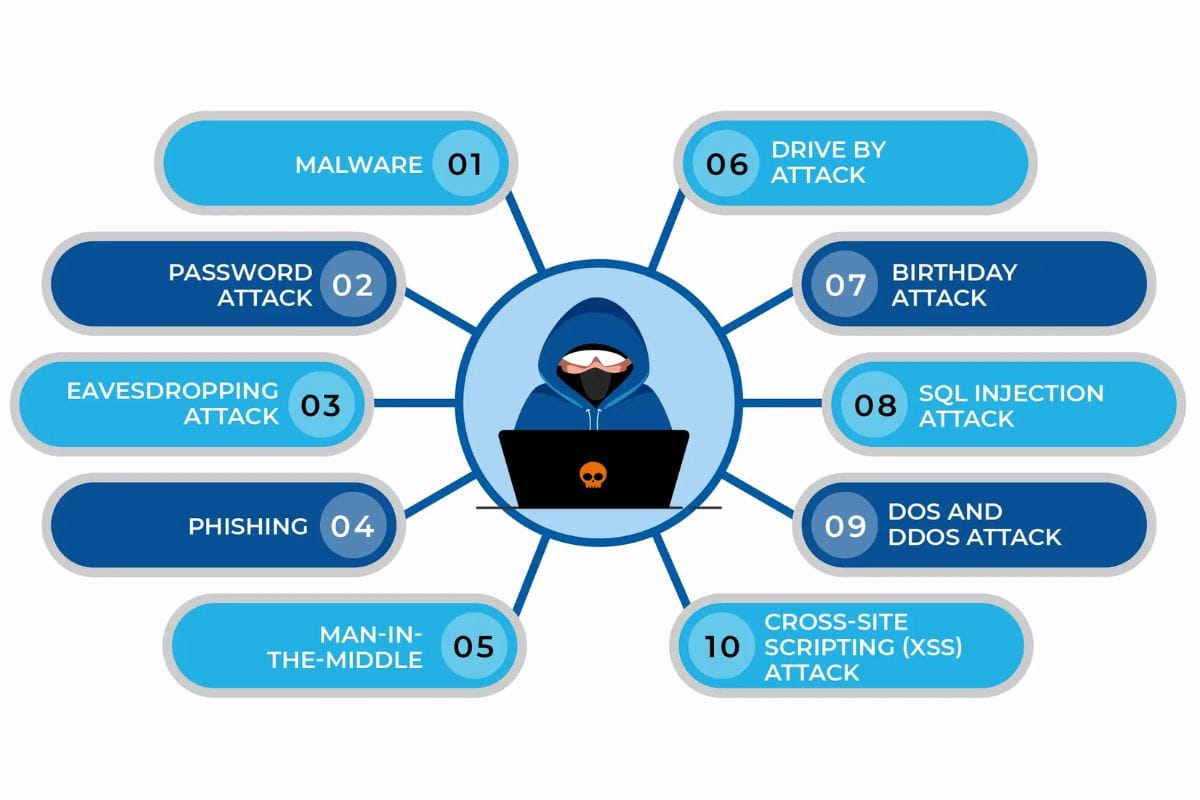The UAE is at the forefront of technological innovation, with a rapidly expanding digital ecosystem that fuels everything from cashless transactions to AI-powered smart services. But with this hyperconnectivity comes an ever-growing threat—cybercrime. As more people and businesses rely on digital platforms, hackers and cybercriminals are finding new ways to exploit vulnerabilities, putting personal data, finances, and even national security at risk.
In response, the UAE has taken major steps to safeguard its digital landscape. The UAE Cybercrime Law (Federal Decree-Law No. 34 of 2021) imposes strict penalties for cyber offences, and government-led initiatives like the Dubai Cyber Security Strategy and the UAE’s National Cybersecurity Strategy are reinforcing protections for individuals and businesses alike.
However, cybersecurity isn’t just about government action but personal responsibility. Whether you’re an individual navigating social media, a business handling sensitive data, or someone simply making online payments, understanding digital security is crucial.
This guide explores common cyber threats in the UAE, key cybersecurity laws, and, most importantly, practical steps to protect your data and prevent cybercrimes in an increasingly digital world.
Common Cyber Threats in the UAE

As Dubai and the UAE continue to embrace digitization, cybercriminals are finding new ways to exploit security gaps. Whether targeting individuals, businesses, or government entities, these threats are becoming more sophisticated and harder to detect. Understanding the most common cyber risks can help residents and businesses stay ahead of potential attacks.
1. Phishing Attacks: Fake Emails & SMS Scams
Phishing is one of the most common cybercrimes in the UAE. Cybercriminals impersonate banks, telecom providers, or government agencies, sending fake emails, SMS, or WhatsApp messages designed to trick victims into revealing passwords, banking details, or Emirates ID numbers.
- Example: A scammer pretends to be your bank and sends a message saying your account will be blocked unless you verify your details via a fake link.
2. Data Breaches & Identity Theft
With expats, tourists, and business professionals constantly sharing personal data online, identity theft is a growing concern. Cybercriminals steal sensitive information through hacked databases, weak passwords, or social engineering, using it to commit fraud or impersonate victims.
- Example: A hacker gains access to an e-commerce website’s customer database, exposing thousands of personal addresses and credit card details.
3. Online Banking & Digital Payment Scams
The rise of cashless payments and mobile banking has made financial fraud more common. Fraudsters trick users into sharing OTPs (one-time passwords) or hack into poorly secured accounts to steal money.
- Example: A fake call from a ‘bank representative’ requesting your OTP code to verify a transaction, only to use it to access and empty your account.
4. Ransomware & Malware Attacks
Hackers use malicious software (malware) or ransomware to lock users out of their own systems and demand payment in exchange for restoring access. This is a significant risk for businesses, where a single cyberattack can disrupt entire operations.
- Example: A Dubai-based company’s network is attacked, encrypting all internal files. The hacker demands Bitcoin payment to unlock them.
5. Social Media Hacking & Privacy Violations
Social media accounts are a prime target for cybercriminals. From account takeovers to deepfake scams, hackers exploit weak passwords and leaked login details to steal identities, spread misinformation, or demand ransoms.
- Example: A hacker gains access to an influencer’s Instagram account, posting scam links and demanding a ransom to return access.
How Cybercrime is Affecting UAE Residents
- Identity theft and scams result in financial losses and emotional distress.
- Companies face data leaks, reputational damage, and legal penalties for security breaches.
- Cyberattacks targeting government institutions and infrastructure threaten the country’s stability.
With cybercrime cases increasing every year, taking preventative measures has become a necessity.
UAE Cybersecurity Laws & Initiatives: How the Government is Fighting Cybercrime
To counter growing cyber threats, the UAE has implemented strict cybersecurity laws and national strategies to protect individuals, businesses, and government entities. The country enforces some of the most advanced digital regulations in the region, with heavy penalties for cybercrimes and specialized units ensuring online safety.
1. The UAE Cybercrime Law (Federal Decree-Law No. 34 of 2021)
The UAE has stringent laws in place to combat cybercrimes, ensuring the safety of individuals and businesses in the digital space. The UAE Cybercrime Law (Federal Decree-Law No. 34 of 2021) outlines severe penalties for offenses such as hacking, identity theft, online fraud, and data breaches.
Key provisions of the law include:
- Unauthorized Access & Hacking: Gaining access to a website, system, or network without permission carries a fine ranging from AED 100,000 to AED 500,000, with imprisonment if damage occurs.
- Personal Data Breaches: Illegally accessing, modifying, or disclosing personal data is punishable by imprisonment and fines from AED 20,000 to AED 100,000.
- Government & Banking Systems: Cybercrimes targeting government, banking, or health institutions carry harsher penalties, including imprisonment for up to 25 years and fines up to AED 3 million.
- Spreading Misinformation & Fake News: Publishing or spreading false information online that harms public interest can lead to fines between AED 100,000 to AED 1 million and imprisonment in severe cases.
- Electronic Fraud & Phishing: Using digital platforms for fraudulent activities can result in imprisonment and fines ranging from AED 150,000 to AED 1 million.
The UAE Cybersecurity Council and the Telecommunications and Digital Government Regulatory Authority (TDRA) actively monitor cyber threats and enforce regulations to protect digital infrastructure.
Source: UAE Legislation Website
2. Dubai Cyber Security Strategy
Launched by Dubai Electronic Security Center (DESC), this initiative aims to make Dubai one of the world’s safest digital cities by focusing on:
- Cybersecurity governance – Strengthening digital security policies for government and private sectors.
- Cyber resilience – Protecting smart city infrastructure and AI-driven services.
- Cyber awareness – Educating businesses and individuals on best security practices.
Source: Dubai Electronic Security Center (DESC)
3. UAE National Cybersecurity Strategy (NCSS)
Implemented by the Telecommunications and Digital Government Regulatory Authority (TDRA), the National Cybersecurity Strategy focuses on building a secure and resilient digital environment for individuals, businesses, and government entities.
Key Objectives:
- Safeguarding Critical Infrastructure – Ensuring the protection of national sectors like energy, finance, and healthcare from cyber threats.
- Enhancing Cybersecurity Capabilities – Developing cybersecurity research, innovation, and specialized training programs.
- Fostering a Cyber-Aware Society – Promoting public awareness and digital safety education.
- Strengthening International Partnerships – Collaborating with global cybersecurity agencies and organizations.
- Regulating Cyber Laws & Compliance – Ensuring businesses follow cybersecurity best practices and comply with UAE laws.
The TDRA strategy aligns with the UAE Vision 2021 and UAE Centennial 2071, aiming to make the country one of the safest digital nations in the world.
Source: UAE National Cybersecurity Strategy (TDRA)
4. UAE Cybercrime Reporting Platforms
If you encounter a cyber threat, you can report it through the following official channels:
- Dubai Police e-Crime Platform – www.dubaipolice.gov.ae
- TDRA Cyber Security Support – www.tdra.gov.ae
- Abu Dhabi Police Aman Service – Call 800 2626 or SMS 2828
Why is this important?
- Faster reporting leads to quicker action against cybercriminals.
- Businesses and individuals can get legal guidance on digital fraud cases.
- Authorities can track and prevent cybercrime trends in the UAE.
How UAE Laws Are Protecting Businesses & Individuals
- Strict penalties deter cybercriminals from targeting UAE residents.
- Government-led cybersecurity initiatives secure both private and public sectors.
- National awareness campaigns educate residents on staying digitally safe.
The UAE is taking a proactive approach to cybersecurity, but digital safety is a shared responsibility. Individuals and businesses must also take steps to protect their data, accounts, and financial transactions.
Practical Steps to Protect Your Digital Life

Cybersecurity isn’t just about government regulations; it is also about taking proactive steps to safeguard your personal and professional data. Whether you’re an individual or a business, following these key security measures can help prevent cyber threats and fraud.
1. Strengthen Password Security
- Use unique, strong passwords with a mix of uppercase, lowercase, numbers, and symbols.
- Avoid using personal details (like birthdays or phone numbers) in passwords.
- Enable two-factor authentication (2FA) for all major accounts, including email, banking, and social media.
- Use a password manager to store and generate secure passwords.
2. Recognize and Avoid Phishing Scams
- Be cautious of emails, messages, or calls claiming to be from banks, government entities, or courier services asking for personal information.
- Always verify the sender’s email address—official entities never use generic domains like @gmail.com or @hotmail.com.
- Avoid clicking on suspicious links in emails or SMS. If in doubt, visit the official website manually.
- Report phishing attempts to the Dubai Police e-Crime platform or TDRA Cyber Security Support.
3. Secure Your Devices and Networks
- Keep software, applications, and operating systems updated to patch vulnerabilities.
- Use legitimate antivirus software to protect against malware and ransomware attacks.
- Avoid using public Wi-Fi for banking or financial transactions. If necessary, use a VPN (Virtual Private Network) for added security.
- Disable Bluetooth and location services when not in use.
4. Protect Online Banking & Financial Transactions
- Never share OTPs, PINs, or passwords with anyone.
- Monitor your bank account statements regularly for unauthorized transactions.
- Use official banking apps and avoid third-party apps for financial transactions.
- Report any suspicious transactions immediately to your bank.
5. Secure Your Social Media & Personal Data
- Adjust privacy settings to limit who can see your personal information.
- Be cautious when accepting friend requests or messages from unknown accounts.
- Avoid oversharing personal details such as location, daily routines, or financial updates.
- Enable login alerts to get notified of any suspicious activity on your account.
6. Backup Your Data Regularly
- Schedule automatic backups for important documents, photos, and financial records.
- Use cloud storage services with strong encryption (such as Google Drive, iCloud, or OneDrive).
- Store sensitive data on an external hard drive as an extra layer of protection.
7. Protect Your Business from Cyber Threats
Businesses in the UAE are frequent targets for cyberattacks, including data breaches, ransomware, and corporate espionage. Essential security practices include:
- Train employees on cybersecurity best practices and social engineering threats.
- Restrict access to sensitive data based on employee roles.
- Conduct regular security audits to identify vulnerabilities.
- Use encrypted communication tools for business conversations and transactions.
- Install firewalls and endpoint security solutions to monitor and prevent cyber threats.
Why These Steps Matter:
By implementing these cybersecurity practices, individuals and businesses in the UAE can:
- Prevent identity theft and financial fraud.
- Reduce the risk of hacking, ransomware, and data leaks.
- Ensure compliance with UAE cyber laws and avoid legal penalties.
- Safeguard personal and corporate data from cybercriminals.
Taking a proactive approach to digital security is no longer an option—it’s a necessity in today’s interconnected world.
What to Do If You’re a Victim of Cybercrime in the UAE
Even with strong security measures, cyberattacks can still happen. If you suspect fraud, hacking, or a data breach, acting quickly can help minimize damage and prevent further risks.
1. Report Cybercrime to UAE Authorities
If you’ve been targeted by fraud, hacking, identity theft, or any online scam, you must report it to official UAE cybercrime units:
- Dubai Police e-Crime Platform – Report hacking, phishing, or financial fraud at www.dubaipolice.gov.ae.
- TDRA Cybersecurity Support – File complaints related to digital security at www.tdra.gov.ae.
- Abu Dhabi Police Aman Service – Report cybercrime by calling 800 2626 or via SMS at 2828.
- Central Bank of the UAE – If your bank account or credit card was compromised, contact your bank immediately and file a report with the UAE Central Bank at www.centralbank.ae.
2. Secure Your Accounts & Devices Immediately
If you suspect hacking or unauthorized access, take the following steps:
- Change all affected passwords immediately, using a strong combination of letters, numbers, and symbols.
- Enable two-factor authentication (2FA) on all important accounts (banking, email, social media).
- Scan your devices for malware using updated antivirus software.
- Log out of all sessions on compromised accounts and review recent activity for suspicious logins.
3. Recover Lost Data & Prevent Further Damage
- For ransomware attacks: Do not pay the ransom. Instead, seek IT security experts to remove the malware.
- For identity theft: Notify relevant authorities and request a fraud alert on your Emirates ID and financial accounts.
- For financial fraud: Contact your bank’s fraud department immediately to block transactions and request chargebacks if necessary.
4. Educate Yourself & Strengthen Your Cybersecurity
Cybercriminals constantly evolve their tactics, so staying informed is key:
- Follow UAE cybersecurity guidelines from Dubai Electronic Security Center (DESC) and UAE Cybersecurity Council.
- Regularly check financial and online accounts for unauthorized activities.
- Be cautious with email links and messages, especially those urging you to take immediate action.
In a world where technology drives convenience and connectivity, cybersecurity is more crucial than ever. The UAE has established robust laws and initiatives to protect individuals and businesses, but digital safety is a shared responsibility.
By staying informed, adopting best practices, and knowing how to respond to cyber threats, you can safeguard your personal data and online presence. Whether it’s securing passwords, avoiding phishing scams, or reporting cybercrime, every small step strengthens your digital security.
As cyber threats continue to evolve, so must our approach to online safety. Be vigilant, stay educated, and embrace cybersecurity as a daily habit.
For more resources and official UAE cybersecurity updates, you can visit the UAE Cybersecurity Council.
Also Read:



















